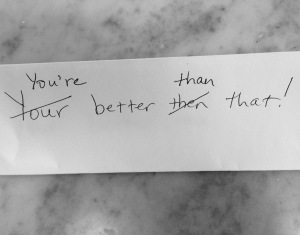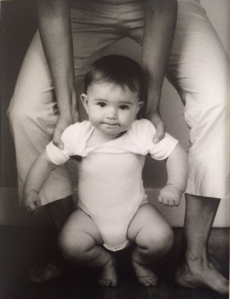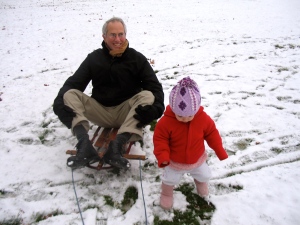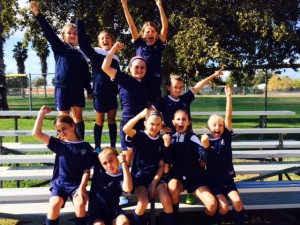
By Dr. Allison Belger
This is one of those articles that might ruffle some feathers, but I’m still willing to write it, because I feel pretty strongly about the message.
About two years ago, I went to a talk at our local high school where my older daughter will matriculate in August (yikes!). The talk was about the increase of alcohol use and abuse by teens in our county, and it was given by a local woman who had learned the hard way how teens in families with the appearance of normalcy can go off the deep end with drugs and alcohol. For me, as a mom of a young teen entering high school–with peer pressure looming large–the subject is particularly timely now.
When asked what the number-one thing parents can do to prevent their children from drinking too much, this speaker stated, without hesitation, that parents should carefully monitor their own drinking habits. She emphasized that parents need to be aware that every time they drink in front of their children or talk about drinking in front of their children, they are modeling the behavior of drinking and reinforcing its presence in their lives.
Earlier in my career as a psychologist, I worked with many populations of teens, from juvenile detention centers to a private setting where wealthy families brought their kids who were getting in trouble in school—the big kind of trouble, not the B+ kind of trouble. There is no doubt that when problematic teen drinking was involved—to be clear teen drinking is inherently problematic—there were almost always parents at home who over-indulged. The kids knew it and talked about it.
Think about it. When you celebrate a birthday, do you make a bunch of margaritas and toss them down with your friends in your home? When your best friend gets a raise, do you go out for celebratory cocktails and tell your kids what you’re up to? When your 15th wedding anniversary rolls around, do you crack a bottle of bubbly and make a toast in front of your teens? When you’ve had a long day at work, do you come home and pour a glass of wine before you cook dinner for your family? Have you finished the bottle by the end of the night?
I’m not interested here in judging social behaviors or trying to get people to drink less. I understand that individuals from all walks of life enjoy alcohol with varied frequency and for various reasons and with varying consequences. However, I do feel quite strongly that social media posting by parents, hailing the beauty of alcohol via carefully edited photographic images, takes a mixed message to another level. While telling their kids that drinking is not okay for them, many parents display and endorse quite publicly their own use of alcohol.
We all know the usual dangers of drinking, hopefully discussed with kids in school, at home, and via public service announcements: alcohol poisoning, breaking the law with permanent record, drinking and driving, date rape and other bad behavior when losing control, group psychology and peer pressure, the list goes on. But what I’m focusing on is the more subliminal effect of glamorizing and romanticizing parental drinking through social media images. Here’s the deal, (keep in mind this is simply my personal opinion): adults on social media who have children with access to social media should not repeatedly post photos hailing the loveliness and pleasures of alcoholic beverages.
Not unlike exposure to violence or to pornography, teens are inundated with images of alcohol on social media and receive the message that “everybody does it, eventually at least, so it must be OK.” The fact that the artistic shots of cocktails with sunsets in the background or the selfies of hands rising in toasts, or the photos of groups of friends chugging beers are being posted by THEIR OWN PARENTS makes it largely impossible for them to ignore; indeed, the consumption of liquor becomes routine, the norm, accepted, and cool.
This is a slippery slope. Next time you’re tempted to post a photo of that gin and tonic or your favorite beer on tap, imagine your child clicking “like” and then heading to the store to grab a bottle for him or herself (with a fake i.d., of course). Easier still, the gin and tonic is probably readily available in your home; he or she can whip one up real quick and take a selfie, inspired by you or his/her best friend’s parents. Maybe you’ll even be tagged and get a few more likes on Instagram.
Forgive my sarcasm. I’m just concerned by how saturated my social media feeds are with these posts by people I like and respect, whose children socialize with mine, and who, I’m quite sure, would prefer that their own kids do not take up drinking, at least not any time soon. To think that there’s some magical, implied, and clear-cut differentiation between adults and kids/teens indulging in alcohol is misguided, at best. One of the most challenging aspects of adolescence involves the push-pull between childhood dependence and emergent independence. Teens have freedoms they once did not, but are restricted in ways their parents are not. It’s a confusing time, to say the least, and there are very few clearly defined behavioral codes enabling them to steer clear of complex and stressful social choices. Parental glorification of alcohol on social media adds an unnecessary element to this longstanding and already challenging scenario.
Just my two cents, but I think it’s definitely worth considering, and being increasingly mindful of, what NOT to post on ubiquitous social outlets.















